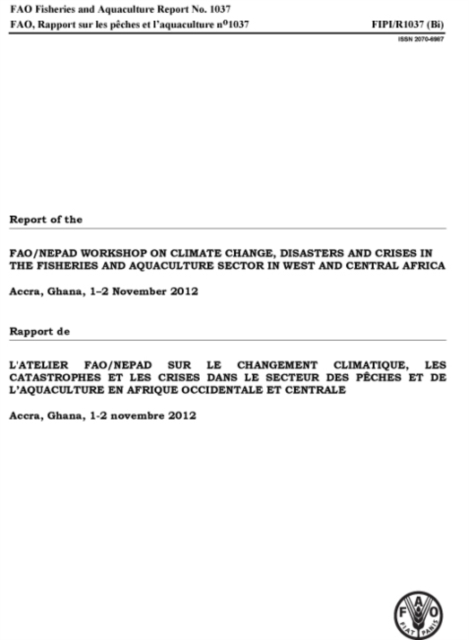
Report of the FAO/NEPAD Workshop on Climate Change, Disaster and Crises in the Fisheries and Aquaculture Sector in West and Central Africa : Accra, Ghana, 1-2 November 2012 Paperback / softback
by Food and Agriculture Organization
Part of the FAO fisheries and aquaculture report series
Paperback / softback
Description
The purpose of the regional workshop on climate change, disasters and crises in the fisheries and aquaculture sector in West and Central Africa was to contribute to a process that is currently underway to determine the gaps in adaptation and disaster risk management strategies, policies and activities that aim to assist fishers, fish farmers, fish workers and the communities they live in to improve their resilience to the impacts of disasters and climate change, and to identify areas to address these gaps based on the experience of the participants.
The workshop was the first of two; the second will focus on Southern and Eastern Africa.
Together they form part of the consultative process of Component C of the NEPAD-FAO Fish Programme (NFFP).
The workshop addressed three main questions in respect to the fisheries and aquaculture sector and the impacts of disasters and climate change: (i) what are the impacts on and the vulnerabilities of the sector, (ii) how has the sector adapted and what can we learn from this, and (iii) what else can be done (and how) to reduce vulnerability and strengthen resilience?
The workshop recommended adaptation actions at local, national and regional levels based on practical experiences and examples of actions that have worked or not in the past.
The workshop outputs will be used to complement the mapping and gap-analysis paper towards a work plan for Component C of the NEPAD-FAO Fish Programme (NFFP).The combined findings of this workshop, the forthcoming workshop for Southern and Eastern Africa and the mapping and gap analysis will be well placed to feed into the pan African process of elaborating a comprehensive fisheries reform strategy and ensuring that climate change and disaster impacts are addressed for the fisheries and aquaculture sector.
Information
-
Available to Order - This title is available to order, with delivery expected within 2 weeks
- Format:Paperback / softback
- Pages:101 pages
- Publisher:Food & Agriculture Organization of the United Nati
- Publication Date:30/05/2014
- Category:
- ISBN:9789250075617
Information
-
Available to Order - This title is available to order, with delivery expected within 2 weeks
- Format:Paperback / softback
- Pages:101 pages
- Publisher:Food & Agriculture Organization of the United Nati
- Publication Date:30/05/2014
- Category:
- ISBN:9789250075617










